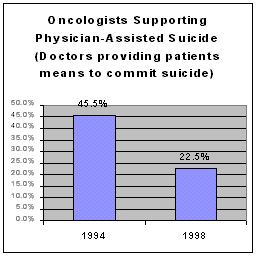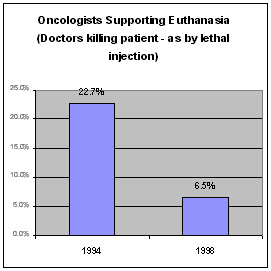
Washington, DC -- A study published October 3 in the Annals of Internal Medicine found that support for assisting suicide and euthanasia among oncologists (physicians specializing in cancer treatment) declined by more than half between 1994 and 1998, a drop the study authors attributed primarily to "expanding knowledge about how to facilitate a 'good death,' making euthanasia and physician-assisted suicide no longer seem necessary or desirable."

Oncologists, who reported that they could get their dying patients all necessary care were over four times less likely to have performed euthanasia, compared to those who reported that administrative, fiscal, and other barriers allowed them to provide only some of the care needed by their dying patients. Those who reported having sufficient time to talk to dying patients and those who believed they had received adequate training in end-of-life care were less likely to have performed euthanasia or physician-assisted suicide. The study authors, Dr. Ezekial Emanuel and seven others, wrote that the date "end some support to [the] concern [that] inadequate access to palliative care might make euthanasia and physician-assisted suicide attractive alternatives."

The study, with 3,299 participants, founds 22.5% of oncologists supported physician-assisted suicide (PAS), compared with 45.5% in 1994. The shift was even more dramatic with regard to euthanasia (here understood to mean the doctor killing the patient, as by lethal injection, instead of providing the patient the means to commit suicide, as in PAS). Only 6.5% supported it, compared to 22.7% in 1994. Of doctors who had actually performed PAS (10.8%), 18% had done so five or more times. Additionally, 3.7% had performed euthanasia, 12% of whom had done so five or more times.
"The significant decline in cancer specialists who support euthanasia demonstrates that the answer to pro-euthanasia activism is not to legalize killing but to redouble efforts to improve care," said Burke J. Balch, J.D., director of NRLC's Department of Medical Ethics. "You don't solve problems by getting rid of the people who have them."
Maine voters will decide November 7 whether to join Oregon in legalizing assisting suicide. A bill now before the U.S. Senate, the Pain Relief Promotion Act (passed by the House in 1999) would end the use of federally controlled drugs to assist suicide, while implementing programs to improve pain relief as a positive alternative.